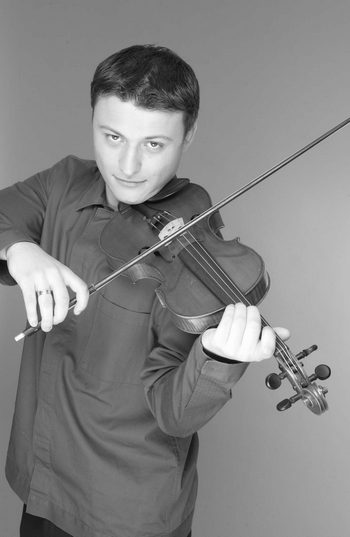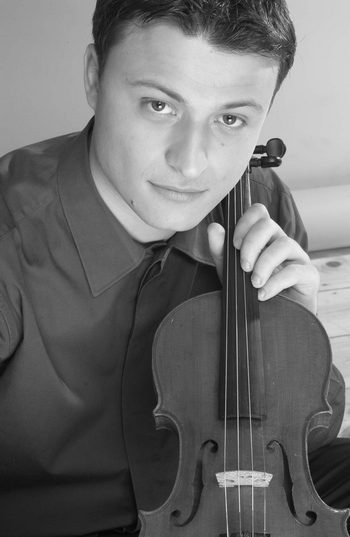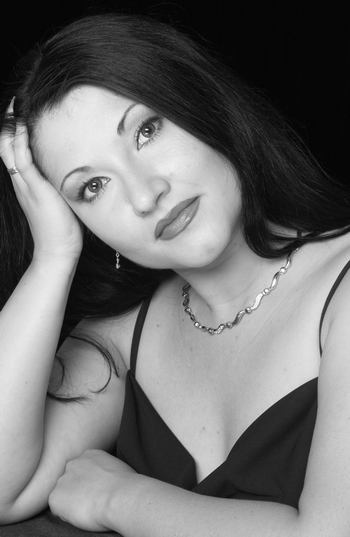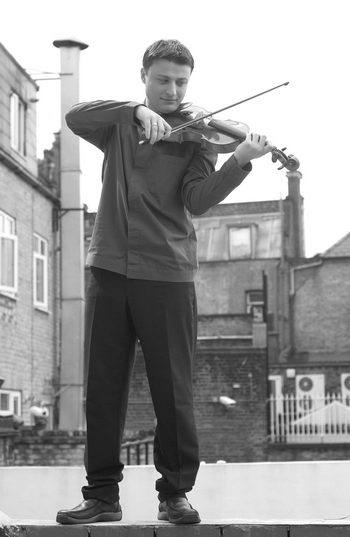Kosara Belnikolova’s interview with the violinist Ivo Stankov

Ivo Stankov has become one of the Bulgaria’s leading artists of his generation. He has performed extensively as a soloist, chamber musician and orchestral leader in numerous countries.
Ivo’s studies took place at Dobri Hristov School of Music and Arts in his
hometown Varna, the Royal Conservatoire in Madrid and the Royal Academy of Music in London, where he was awarded a full scholarship from Flame Trust, to study with Erich Gruenberg. He is a recipient of many prizes and awards including the Craxton Memorial Trust Award, London, and the Honours Diploma Award from the Royal Conservatoire in Madrid.Since settling in the UK, Ivo has worked with many orchestras, recorded for television and on CD, as well as playing for West End shows. He is the leader of the Schomberg String Quartet, featured recently in both Channel 4 ‘s “Operatunity – The Winners”, and Operababes’ Nationwide Tours.
Ivo is the Artistic Director of London Festival of Bulgarian Culture – LFBC, which celebrates the Bulgarian Cultural Heritage, and which first edition will be held in November 2010
Could you describe yourself in five words?
Motivated, a well-wishing person, believer, sometimes impatient and generally positive!
You gained musical qualification in Bulgaria but your carreer abroad is amazing. What was it like to work with geniuses like Alfonso Saura at the age of 14?
I was chosen to be one of the students being offered a place in a chamber orchestra in Spain at the age of 14, along with a few fellow Bulgarian students from the music school in Varna. It was not easy at first to live in a foreign country at that age (and not speaking the language at all, at first), and to be away from family. But having other Bulgarian friends around made it easier for me to adjust, and especially to cope with the language barrier.
This was a chance for me to perform professionally with some great musicians – colleagues, conductors, and soloists, and to learn from them.
Also at that age, having to play concerts almost every week offered a valuable experience which really confirmed my choice of profession, and I knew that “that’s what I wanted to do as a career!” I had the pleasure of playing with musicians such as the violinists Yosif Radionov, and Jose Luis Garcia (leader of the English Chamber Orchestra), as well as being given the opportunity to perform as a soloist in numerous occasions under the baton of conductors such as Alfonso Saura, and Georgio Leardini.
How did you get to love music and what made you choose it as your profession?
I was introduced to the sounds of the violin from a very early age – my mother is a violinist as well, as my grandfather was, so I didn’t really have a choice but to follow in their footstep In fact, for as long as I can remember I have always been surrounded by music – a “love affair” with it I guess, started quite early in my life. It wasn’t always easy, having to practice for a few hours every day is not exactly the obvious choice for a child – kids would rather spend time playing with their friends, but I am very grateful now, especially to my mother, who was at that time encouraging me to practice at home.
The violin is probably one of the most difficult instruments to learn so playing it well requires a good level of technical command of the instrument. I suppose I started to really enjoy playing when I was 12 or 13 years old – the repertoire I was playing by then also became more interesting, and more demanding technically which made it more fun as well – I liked the challenges! And probably the most thrilling part of all this for me has always been performing on stage in front of an audience. I gradually started realizing that I have this inner desire for music making, and that couldn’t possibly live without that “adrenalin rush” feeling of performing on stage, so I suppose it all made me think seriously about pursuing a career in music.
Who has influenced you the most? Who are your favorite musicians and composers?
I consider myself lucky to have had a number of very good teachers I have learned a lot from.But the two people who have really had a great influence on my musicianship were Jose Luis Garcia (who was the leader for many years of the English Chamber Orchestra), who is also a great person and treats his students as “one of the family” – for example, after lessons at his home he would always ask me to stay around for lunch with his wife and have a nice chat!
The other person was my teacher at the Royal Academy of Music Eric Gruenberg (who is one of the founders of Philharmonia Orchestra in London), and who was a fantastic influence on me musically, probably setting me free from some musical “dogmas” and encouraging me to be able to create and express music in a natural and personal way – to find my own interpretation and not follow someone else’s, to be able to communicate clearly my own musical ideas in an honest way.
I have a number of musicians and performers which I truly respect – I want to mention the Bulgarian violinist Yosif Radionov who is an incredibly and naturally gifted performer and communicator, also with a fantastic personality. There are other violinists which I like as well, maybe the one who is currently setting the standard in many ways, Frank Peter Zimmermann, is also one of my favorite musicians. And of course, my all time favorite – the great David Oistrach.
I enjoy performing and listening to all kind of music so there are quite a few composers I like, maybe I am slightly more inclined towards the romantic period compositions as many of them are charged with passion and energy which suits me quite well – Tchaikovsky and Brahms for example. Also, I like Beethoven and Mozart, and really love performing some of Ravel’s music – especially his piano trio and the Fantasy “Tzigane”!

You have worked with top professionals such as Mark Knopfler from Dire Straits and you have performed in some of the most famous concert halls – Wigmore Hall, Royal Albert Hall, etc.
What do you consider to be your greatest professional achievement so far?
I have had the pleasure to perform recently alongside Mark Knopfler, who also happens to be one of my favorite musicians – I have most of Dire Straits CD’s in my collection! It was a bit surreal because I taught his daughter for a while and performed at school concerts (where he would come to support her), then out of the blue one day received a phone call from his manager asking me to play a song with Mark which he had written for his last album, which has a solo violin part, and which, of course, I was thrilled to perform alongside him and his pianist Guy Fletcher at an event in London!
It’s hard to single out a performance or a concert date and say “this is my biggest achievement;” all my performances have been important to me, because every one is unique in a way – it can’t happen twice exactly the same.
Certainly there are some I have enjoyed more than others – it was quite exciting to be able to perform twice at the Wigmore Hall in London, which is my favorite concert hall without a doubt. And also performing at the Royal Albert Hall in front of around 5000 people the Elgar violin concerto, with a 100 piece orchestra at the Royal Albert Hall, was an exhilarating experience!
What do you like doing in your free time?
I don’t really have free time!:) Well, not true exactly, I love spending time and playing with my little son Theo who is 14 months old – it is such a joy to be able to come home to see a smiling face greeting you and longing for you to take him in your arms. It’s an incredible feeling! Besides that (not that parenthood is always that relaxing!), I enjoy browsing the internet, watching some movies (big epic movies fan!), watching and playing (not as often as I would like unfortunately) some football, snooker, golf, tennis, Formula 1…
Where do you prefer to work – in Bulgaria or abroad? What are the differences?
Being a musician sometimes gives you the opportunity to be able to work at different times in different countries. I travel as a freelance musician quite a bit and enjoy doing that, including playing occasionally in Bulgaria. I also combine performing with teaching and my work is now mainly based in London.
Maybe it’s not quite possible to compare on the same basis the music scene in Bulgaria (and the work situation there) to the musical scene in London because it is such a big place offering so many and diverse performing opportunities. That is what I really like about working in London – being able to play a wide range of different styles, perform solo as well as with other chamber music groups, play and record all kinds of music (from classical to electronic, and even performing in Chicago the Musical!).
Again, I don’t think it would be fair on these terms to compare Bulgaria with one of the world’s cultural capitals, which has nearly double the population of the entirety of Bulgaria, and where there are 140 theatres and over 400 performances happening every single day! But I always love coming back and performing in Bulgaria!
Tell us more about Stankov Ensemble.
This is a Trio chamber ensemble, consisting of my wife, the soprano Vania Vatralova-Stankov; my brother, the pianist Lachezar Stankov, and myself. Each of us has a busy career on our own, but we also love performing together and this is why the Stankov Ensemble came to existence.
We are exploring some very interesting pieces, especially involving the soprano/violin, which is quite unusual and at the same time fascinating. A few composers have written works especially for our ensemble, which we really consider an honor. We have performed at the Sofia Winter Festival last year, and also are performing regularly throughout the United Kingdom. We also have a project for a CD recording in 2011.

You are the artistic director of the Festival of Bulgarian Culture. How did this idea arise? What does the festival include and what are its goals?
The idea was born from my wife Vania and I performing in the UK for the last 10 years. We had been asked numerous times from members of the audiences about performing Bulgarian pieces, and those performances of Bulgarian music have always been accepted very enthusiastically. The idea also considers the fact that Bulgarian classical music is widely unknown to British audiences in general.
So eventually the ball started rolling – we realized that probably the best way to present our culture would be to organize a festival so people would have the chance to hear Bulgarian music in a number of concerts and other events. That is how the project started, and now after nearly two years of hard work I am proud to announce that the first festival of Bulgarian culture in London will be held through November 2010. There are some fantastic performers taking part: the internationally renowned choir Le Mystere Des Voix Bulgares, London Bulgarian Choir, the renowned Bulgarian chamber orchestra, Sofia Soloists (some of the most recognized quartets in the USA and Britain), Forte String Quartet and Bridge Quartet (both celebrating their 20th Anniversary seasons this year). Also we have included in the festival’s programme World and UK Premieres of works written by Bulgarian and British composers, such as Dobrinka Tabakova, Martin Georgiev, John Howard and Gwyn Pritchard.
The festival also includes a painting and sculpture exhibition, an educational master class for children (on Bulgarian works), a lecture and a few other supporting events.
Our goals are to present the Bulgarian culture, to promote the Bulgarian performers, to popularize and bring the works of Bulgarian composers to wider audiences in Britain, and to encourage and strengthen intercultural links between Bulgarian and British artists.
All this will be a great cultural feast and celebration of our Bulgarian heritage, presented as such for the first time in London, so we are quite excited about this project!
Just a couple of weeks from now, on June 2, you have a concert in the National Gallery for Foreign Art, called “Violin and Voice”. What can your admirers expect from you and your wife – Vania Vatralova-Stankov who is a well-known opera singer?
We are presenting in this occasion an exciting—and at the same time unusual—choice of works written in the first half of the 20th Century especially for duo of voice and violin. The first half will feature some English works by Holst, Vaughan-Williams, and folk songs by Rebecca Clark, who is the first internationally recognized English-woman composer. In the second half we will introduce some intriguing and less known works (some of them played for the first time in Bulgaria) such as Hercules by the Armenian-American composer Alan Hovhanes, Francesca Da Rimini by the China born Russian-German composer Boris Blacher, and the explosively rhythmical songs by Brazilian composer Hector Villa-Lobos. Deserving a special mention is the cycle of three songs on texts by Dora Gabe, written by the award-winning young Bulgarian composer Martin Georgiev, who is living in London. He has dedicated this composition to Stankov Ensemble, and we will perform the songs in their World Premiere at this concert.

What is it like to play a musical instrument which is over two hundred years old?
The first thing – you have to be extra careful with it! On a more serious note – it is a fantastic Italian violin, made by the brothers Joseph and Antonio Gagliano in 1878. It feels quite easy to make a beautiful sound on it, because of the special and unique way such an old piece of wood is able to project sound, so it does make a big difference to me as a player, and I suppose the audience also appreciates that.
What advice would you give to all the young artists who have yet begun their careers?
Well, I don’t feel (yet!) as experienced as other musicians with maybe 30 or 40 years in the music profession, but from my perspective I would suggest to any younger artist wishing to succeed to keep going and to keep trying to achieve their goals. Preparation (good practice) is obviously the first step, but also things like perseverance and searching for the unique, special thing which sets you apart from the crowd. This is really important these days. So here is my advice – search for your special qualities, keep going however difficult it might seem at the time, have fun and love the music, and never give up!











6 comments so far ↓
Nobody has commented yet. Be the first!
Comment